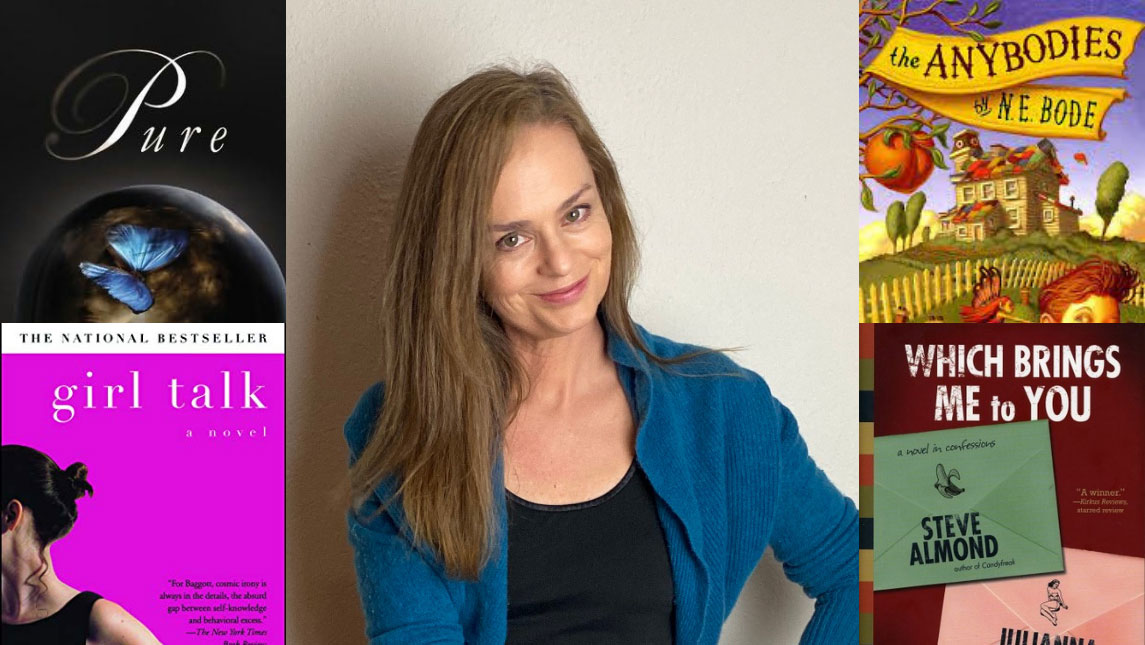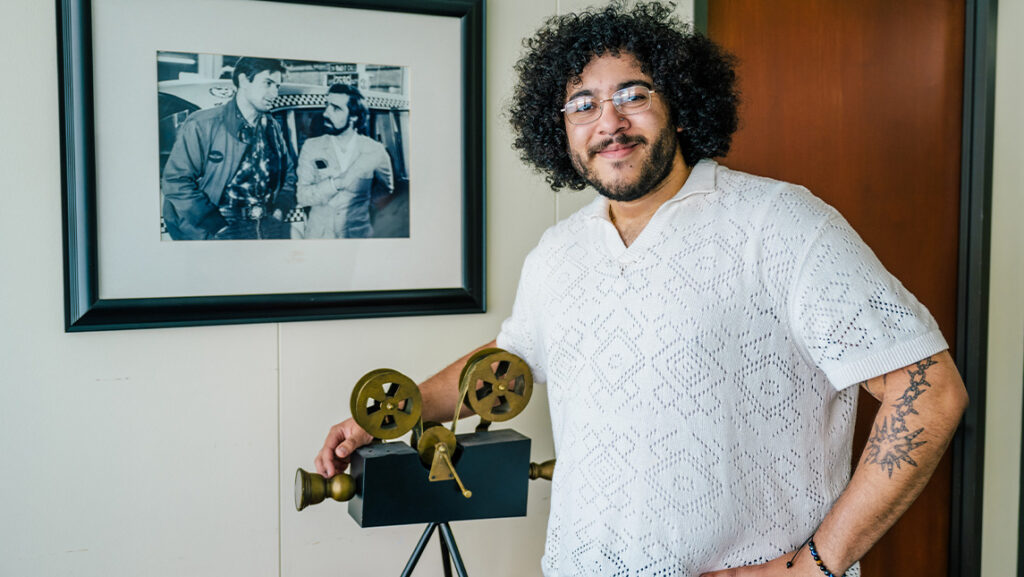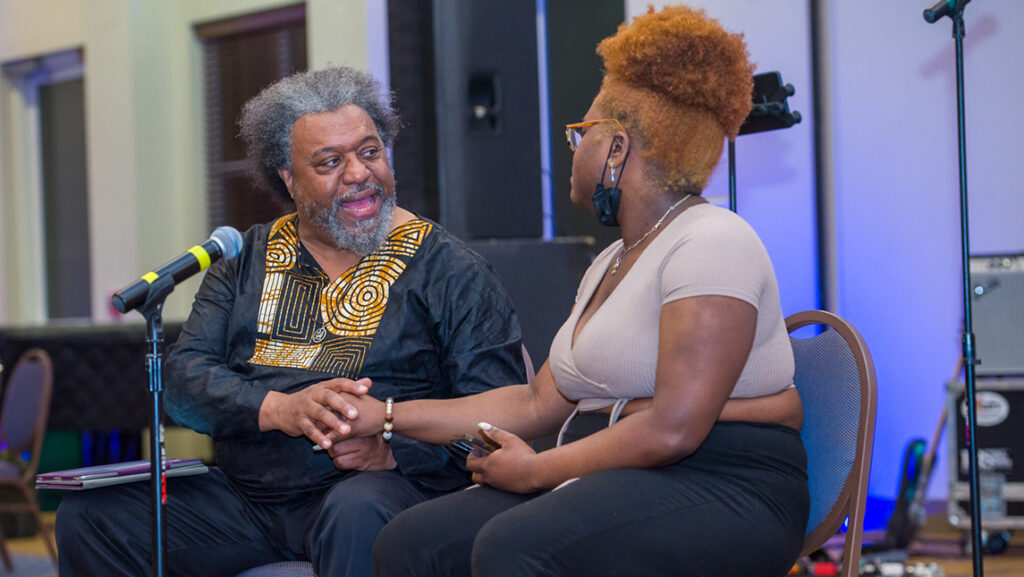
Bestselling author Julianna Baggott 93’ MFA is a bit like a superhero who, when you’re not looking, bursts out of a phone booth in a new costume, ready for action and adventure.
But not just once. She doesn’t complete just her mission and go back to a quiet “normal” life. A few years – or even just months – later, she’s back in action, leaping over figurative buildings in a new genre.
Baggott is a nationally bestselling author of 21 novels, including several named “Notable Book of the Year” by the New York Times. One of those is “Pure,” the first in a dystopian thriller trilogy that has been translated into 15 languages. Baggott published many short stories in literary journals and also her debut novel, “Girl Talk,” with Simon and Schuster not long after graduating from UNC Greensboro’s MFA in Creative Writing Program.
In the midst of her career as a fiction writer, Baggott also wrote and published four books of poetry through Louisiana State University Press and Southern Illinois University Press.
Her third and fourth word-weaving alter egos have their own pen names: Bridget Asher, publishing through Random House, and N.E. Bode, who wrote the celebrated children’s series “The Anybodies,” published by Harper Collins.
And now, Baggott appears from the phone booth a fifth time as her work comes to life on the screen.
She currently has 17 projects in development for film and television, including writing and producing contracts with Paramount, Disney, Warner Brothers, and Iron Ocean, actress Jessica Biel’s production company.
Next week, BCDF Pictures is taking a screenplay to Cannes that’s based on a novel by Baggott and a fellow UNCG MFA alum, Steve Almond: “Which Brings Me to You,” which will star Lucy Hale.
Simultaneously, Baggott’s story “Welcome to Oxhead” is in development with Paramount and recently, Netflix won a six-way bidding war for “Backwards,” a story by Baggott and her son Finneas Scott that will be directed by Shawn Levy. Paramount Pictures has also just snagged “Rabbit, Rabbit, Rabbit,” a horror story by Baggott.
But wait – just when you’d thought she’d done everything, Baggott emerges again, as a professor at the College of Motion Picture Arts at Florida State University, where she’s taught screenwriters and young directors for the past 10 years.
How did she get here, a bestselling novelist, short story writer, poet, film producer, and professor?
Her story as a professional writer has, at its roots, UNCG.
While enrolled in the graduate Creative Writing Program at UNCG, she served as one of the student editors for The Greensboro Review, which she calls “a crash course in becoming the audience and writing for editors.” She also fondly remembers seeing distinguished visiting writers read, like Lewis Norton, and working with MFA Creative Writing Program and media studies faculty.
What did you learn by serving as one of the fiction editors for the Greensboro Review?
Reading stories, sometimes you see it in the first sentence – it’s crafted in a certain way and you go, “Okay, this person knows story. They know how to enter.” I would say 90% of the decisions you have to make in a short story are done in the first paragraph there, the structural things, point of view. And voice is so important. So, reading submissions really opened up something for me; it created a hole in my stomach. Why am I not being fed? What do I need to be fed, as a reader? So, reading submissions is all of this consumption with no satisfaction, but very occasionally you get one and you say, “Oh, my gosh: finally.”
And it’s so exciting when one comes across that is so good. It made me very hungry for a satisfying meal. I learned how to write for an editor who sees a blinding amount of material all the time, and it made it clear how I wanted to stand out in that crowd. But also made it clear how subjective the process is. I was sitting with a friend of mine at the Greensboro Review office, and we were both reading submissions, and she groaned while reading the story.
I said, “What’s so terrible about that story?”
And she told me the plot, and then I said, “I’ll read it when you’re done. Because that sounds weird and good.”
She said, “You can read it right now,” and she threw it at me.
It was a story we eventually printed – I fell in love with it. It was by a writer named Laurie Foos, who’s gone on to write a number of books, and who I adore for her very, very unusual imagination. So, if my friend hadn’t hated it enough to groan, it never would have gotten published by somebody who loved it, enough to publish it. That kind of thing was a huge relief for me going forward. Rejection just means somebody didn’t groan loudly enough to get somebody else’s attention. It is so subjective. And once you realize that, it’s about writing enough work and getting enough out there so it finds the right people.
What was it like working with UNCG faculty?
I remember working with Fred (Chappell), and he could be a defender of work. Sometimes, if you felt something was getting roughed up in workshop, he knew how to handle that. One time, I went in after I’d given him what I’d written over the summer, and he started talking about it, honestly. Not bad criticism – nice things – and he talked about the things that needed work. There was nothing wrong with the criticism, but I ]burst into tears – \because I had so much at stake. And I think it might have been the nice things that he said that made me burst into tears. Anyway, he pushed the tissue box over, because he had tissues on hand for criers. He very gently pushed the tissue box and let me continue to cry. I didn’t want to miss out on the meeting, and he knew, and he kept talking. He was very generous in that moment, and I write him letters all the time. I don’t send them, but I write Fred letters all the time. Sometimes I’ll see them scribbled in the back of a book, like, oh – there’s a “Dear Fred” letter. It’s a very strange habit, but he helps me an awful lot, not knowing that he helps me.
The head of my thesis committee was Lee’s Zacharias, and she was excellent on story and on character. And she was really encouraging about my work, early on, really went to bat for me. I also I worked with Anthony Fragola in screenwriting for a year, a very generous teacher, and he put up with me.
How did you decide to focus on your work for television, and how have you done that especially during the past two years?
I said to myself, “Well, that’s where the energy is and I should meet them. What if it was my job to write a story a week?” The old sci fi writers – that’s how they made their bread and butter. They actually made money writing stories. I said to myself, “Try to do it with an eye towards film and television.”
But if it’s a literary story that shows up that week – the literary story is my job. I put myself on a very aggressive regimen during COVID, too. I think part of it was a coping mechanism. And, I’ve always had this – I think it came from when I had kids, and no one expected me as a mother to be writing. I loved that I felt very incognito and that when nobody was looking, I would come to life, like it was a disguise – motherhood was a disguise. When nobody was looking, I would be writing, and I had this secret life. So, I think during COVID I just felt like “Nobody’s looking, and I’m just gonna write really hard.”
And I never thought of myself as a novelist then. I was always more of a short story writer in terms of …maybe “metabolism” might be the right word. I’m a sprinter. I taught myself how to write novels, and worked in that kind of marathon space for a long time.
What’s it like having your work adapted for film?
It’s very much a Buddhist process. I really let go. One of the things that comes up again and again is: Do you want to be the screenwriter? Do you want to adapt? I have written a lot of features and pilots, and I have tons of samples. But right now, my mission is so clear: I’m enjoying writing intellectual property, coming up with big ideas and writing them in a very intimate way. And I feel that’s my job. I don’t want to be in a writers’ room at this point.
I’m a producer on most of the projects that I have now, but it’s not a hands-on producer role. I won’t be on set, and that’s by design. Because first of all, I love collaboration. I’ve come to really love the work that screenwriters do – incredible adaptations that I’ve read over the years. I really admire them, and I enjoy seeing somebody else get in there and muck around in my world. I could see a possibility that one day, I will say, “No, I have to be the writer on this.” But if I say ‘yes’ to that, I know that is saying ‘no’ to other things. And I really am enjoying the process right now of doing original work. This is my path. It is writing the work, and then letting it go into the world. And then sitting down and writing the next one, and then letting that one go into the world.
What is the most important thing you do as a writer?
My main job, as a writer, is to protect my relationship with the page. That takes a lot of thoughtfulness and intention for a lot of different reasons. At times in my life I’ve been a full-time professor, and I have four kids, and a marriage … and those things are very, very important to me, all those relationships, but also the relationship with the page is one that’s very much alive and requires my attention.
I am not one of those people who particularly cares what I’m writing in a way. I mean, it will always be me. In a lot of ways, most of my career has been trying to figure out ways to not be me, and to write different genres, and that’s part of protecting my relationship. And one of the things is that if I feel like I’m writing “me” again, being “me-ish” about it, I get bored. So, being a cross-genre writer has been part of that, to keep myself healthy, and wanting to keep writing. It’s about energy, it’s about criticism, it’s about rejection, it’s about people being weird to writers.
I’m like Cal Ripken, I guess. He’s a baseball player who had a long career and he played all different positions. His job was: Just don’t take me off the field. And that’s the way I think about my relationship with the page. Or, it’s like Michael Caine. Some actors go at it like “No, I want to do this role, because it’s my art,” but Michael Caine is more like, “No, I’m an actor; I take the job.” So, yes, we saw him in “Jaws III,” but we also saw him win an Academy Award for “The Cider House Rules.”
I’ve also come to terms with the fact that no matter how commercial or how much I’m writing to a market or to an audience, it’s still going to be me. And I’m still going to be an artist doing it. I’ve stopped worrying “Is this art?” or “Is this commercial?” For me, there’s always going to be both things present in anything I do. Because I’m always thinking about audience – I am obsessed with the reader. I want them to keep turning pages. I want to have a conversation with them. I’m never going to just do it for myself, art for art’s sake. And then when I’m trying to be commercial, and trying to write something that, very specifically, could reach a broader audience, I’m still going to do it in my own artsy way, no matter how much I try to be commercial. I don’t have to worry about being an artist because I am one.
What makes you feel accomplished as a writer?
There’s a lot of days in writing a novel when you can feel pretty competent, and roll up your sleeves, and know the job you have to do. Those days are great – when you’ve already made 90% of the decisions and you kind of know the ending, and your job is to wake up and land somewhere in the middle and be writing or rewriting this scene or that scene. Those are great days, because you’re just you’re just a worker and it’s just craft.
In writing short stories, there are very few days like that, because I write pretty quickly.
Figuring out what the story is – that’s a very restless period for me, where I do a lot of pacing and a lot of false starts, and I can be very frustrated, and I can’t find my way in. There are a lot of those kinds of days and then in writing endings, I’m just gripping, trying to hold on to get to the end.
With stories, there are very few days that are about the middle, because the process just flips so fast. There are very few days where I feel like I know what I’m doing. But, again, I like the puzzle of them, the challenge of each one, because each one brings you back to ground zero, where you’ve got nothing and you’ve got to build. Starting from scratch over and over again is very demanding. You have nothing and from nothing, you have to make something.
Story and interview by Susan Kirby-Smith, University Communications


